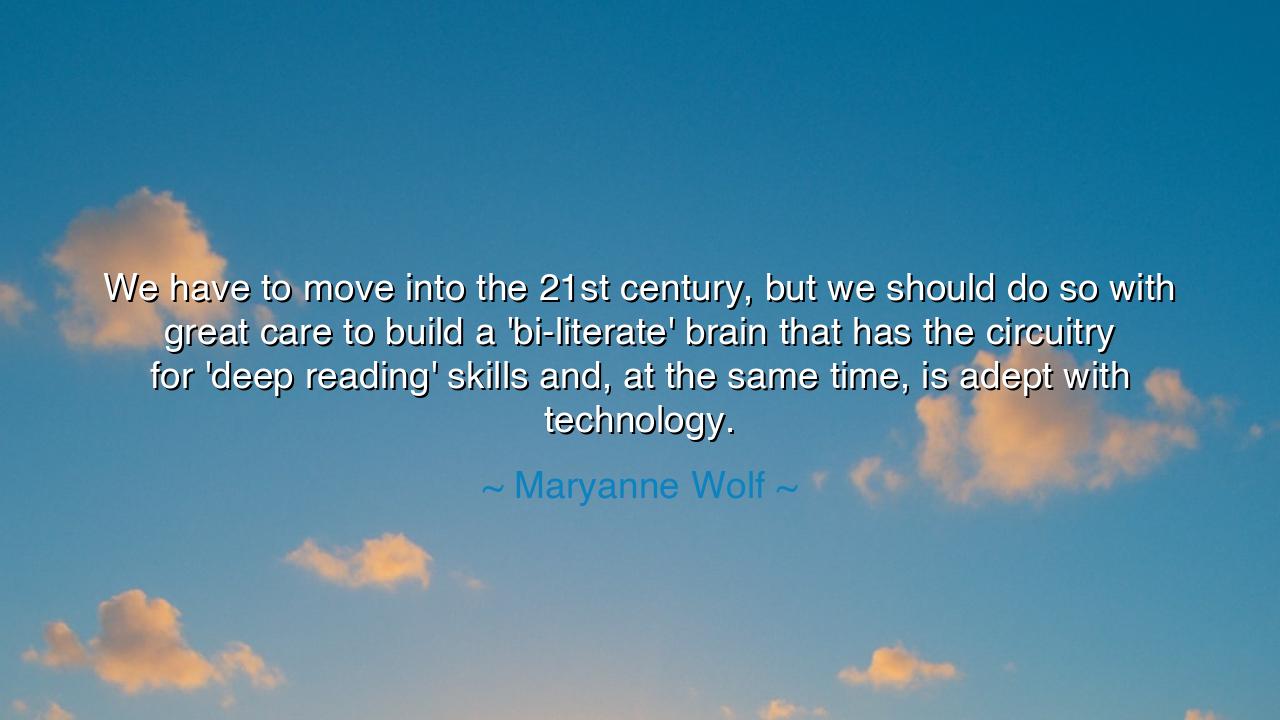
We have to move into the 21st century, but we should do so with
We have to move into the 21st century, but we should do so with great care to build a 'bi-literate' brain that has the circuitry for 'deep reading' skills and, at the same time, is adept with technology.






Maryanne Wolf, a guardian of the written word and a scholar of the mind, speaks with the gravity of one who sees both promise and peril: “We have to move into the 21st century, but we should do so with great care to build a ‘bi-literate’ brain that has the circuitry for ‘deep reading’ skills and, at the same time, is adept with technology.” In this saying lies a profound call to balance, a reminder that while we stride into the glowing future of technology, we must not abandon the ancient wisdom of deep reading, which shaped our very civilization.
For the bi-literate brain is no simple phrase—it is a vision of humanity’s mind being stretched in two directions: one toward the timeless art of sustained thought, the other toward the swift currents of the digital age. Wolf reminds us that to truly flourish, we must cultivate both: the slow fire of contemplation and the quick spark of information. If we give ourselves wholly to speed and screens, our capacity for patience, reflection, and empathy withers. If we cling only to the old ways, we risk being left behind, unprepared for the vast ocean of knowledge and connection that defines this century.
Consider the origin of deep reading. Long ago, in the shadow of the Library of Alexandria, men and women pored over scrolls, absorbing wisdom line by line, thought by thought. Reading was not mere consumption, but transformation. A single passage could linger for days, turning in the mind, shaping moral vision and awakening imagination. This capacity to wrestle with words, to build inner depth, is the fruit of centuries of practice. It is the kind of reading that births philosophers, poets, reformers, and visionaries. To lose it would be to sever our connection to the very roots of human thought.
Yet history also shows us the danger of resisting change. When the printing press spread across Europe, some feared it would cheapen knowledge, flooding the world with shallow words. But those who embraced it harnessed its power to spread truth, to ignite reformations, and to spark revolutions. Likewise, in our time, technology offers unprecedented reach. It connects distant voices, multiplies learning, and places the storehouse of human knowledge in every hand. To reject it would be folly. To embrace it without caution would be ruin. Thus Wolf calls us not to choose one path, but to weave them together into a stronger whole.
We may look to a modern example: the rise of the Internet. It has taught us to skim, to leap from link to link, to gather fragments. This brings breadth but not depth. A student who reads only headlines knows the surface of the world but not its foundations. Yet when that same student also learns to pause, to enter the stillness of deep reading, they gain not just facts, but wisdom. The union of both skills—the ability to navigate swiftly and to contemplate deeply—creates a mind both agile and profound. This is the bi-literate brain Wolf envisions.
The lesson is clear: progress must be married to preservation. Let us not allow technology to steal from us the riches of patience, imagination, and empathy. At the same time, let us not cling to old forms so tightly that we lose the gifts of the present. The future belongs to those who can both plunge into the silence of a book and soar across the networks of the world. Such balance is rare, but it is the golden key to thriving in our century.
Therefore, O seekers of wisdom, practice both arts. Each day, set aside moments for deep reading, where the mind may drink slowly, like roots drawing from the earth. And also, train your hands and eyes in the craft of technology, that you may navigate the modern sea with confidence. In this harmony lies not only survival but greatness: a generation that is as thoughtful as it is innovative, as reflective as it is connected.
Thus, Wolf’s words stand as a torch in our time: embrace the 21st century, but carry with you the ancient gift of deep thought. Build the bi-literate brain, and you will walk as one who can hold both past and future, depth and speed, silence and connection. And from such a balance, a wiser humanity shall emerge.






AAdministratorAdministrator
Welcome, honored guests. Please leave a comment, we will respond soon